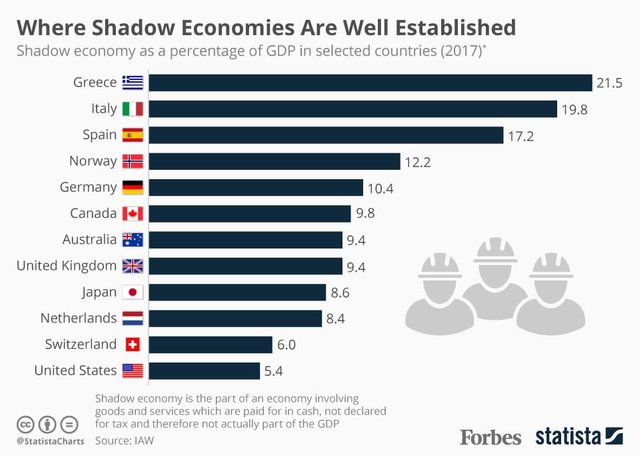
This article seeks to delve into the problem of the underground economy globally and how the blockchain and the death of paper money is likely going to solve it and will likely do so in the next decade.
1. The Problem
I live in Canada, where the "underground economy" (cash based, unreported income) was estimated as being at 45.6 Billion dollars in 2013. Research by Statistics Canada also highlighted that four sectors accounted for nearly two-thirds of the total estimated underground economy: residential construction (28 per cent); finance, insurance, real estate, rental, leasing and holding companies (13 per cent); retail trade (13 per cent); and accommodation and food services (12 per cent). The estimates for more recent years do not appear to be available.
The 45.6 billion dollar unreported number for 2013 is staggering when you consider that total individual income tax collected for 2016 in Canada was 144.9 billion according to the Federal government's annual report.
There is also the cost of enforcement, with Canada spending 2 cents out of every tax dollar on the tax agency's administration and enforcement (4 billion dollars in total).
This unreported income, as you would expect, has a significant impact on Canada's taxation rates - when there are less shoulders to bear the weight of the revenues that the government needs, everyone must bear more weight. That is certainly the case in Canada, where the top individual personal income tax rate is 53.53% on income over $220,000 (keep in mind that the average detached home in Toronto Ontario is priced above one million dollars). This is before you factor in property taxes, and 13% tax on all goods and services transactions, etc etc.
Incredibly, Canada isn't the worst example out there. Have a look at this chart from Forbes to consider the scale of the problem:

These numbers do not even take into account the fancy corporate tricks that the big banks and corporations play in diverting income attribution, shell corporations, "tax planning" and the like, which often makes commentators like Max Keiser very angry (see 2 minute video below for just how angry!):
2. The Blockchain's role in solving it
What is clear is that the scale of the shadow economy problem is massive. The problem is not an easy one for the government to solve, since it is extremely difficult to track cash payments. Government revenue agencies often have to try to do forensic analysis of spending patterns etc.
Now imagine if the government implemented a blockchain based currency and payment system. Each citizen could be issued an address on the blockchain and the government would be able to see all outgoing payments and incoming payments simply by examining the blockchain. While that sounds kind of "big brotherish", the truth is that governments already do that when investigating someone by looking at bank account statements, receipts etc and following the paper trails. Now, of course, people could still hide money in other ways (ie: digital currency), but it would be a heck of a lot easier to track those outflows into those places by examining a blockchain ledger.
In terms of enforcement costs, imagine the interesting possibilities that it creates for revenue generation (taxation by the government). Rather than taxing each person based on income (which in itself is a stupid way to try to balance equality - since someone could have a good earnings year one year, but be nowhere near equal to the person or corporation hoarding millions of dollars).
There is an economist named Robert Reich who ties much of the stagnation in middle class economic growth to the centalization of "dead money" by large corporations (see his fabulous documentary titled "Inequality for all"- http://inequalityforall.com/). With a blockchain system, a government could choose to tax based on wealth accumulation by examining the blockchain addresses.
Even more interesting would be if a government considered an even more novel approach and simply followed the lead of crypto-democracies like Tezos, by simply imposing a yearly percentage inflation of the currency. While Tezos grants that currency to the stakeholders within the system, a nation could theoretically keep the newly created 3-5% of the currency as taxation/revenue generation, without needing to go and take it from anyone. No one need file taxes, pay taxes, audit, chase people for taxes, etc.
Instead, the government simply prints/mints 3-5% more currency per year and keeps it to fund the programs. The existing currency thus loses about 3-5% of its value per year as more is printed - but the beauty is that the only people who feel that devaluation are the ones who have the money, and they feel it more as they hold more money, and less if they hold less money. The poor would essentially "pay no tax" since they have very little money to devalue. Further, there is a clear and present incentive to spend your money on items that you desire, and to fund research and innovation rather than holding vast stores of "dead money".
While this may not be a very popular model among certain "Yuge" political parties that have very wealthy corporate backers, the truth is that it could significantly shrink the need for government, do away with unnecessary enforcement and administration and provide some equity and a better incentive model as well. The rise of the Bernie Sanders and Trump's of the world's seemed to me to be like primal scream from a populous that has seen their incomes stagnate or decrease, or in some cases evaporate entirely, while corporations benefit off of modern day slave labour in other countries, or horde vast stores of wealth that they could never use.
I believe that crypto and blockchain are about more than big block versus small block, I believe that it can change our world, I believe that it can save us from an economy and society that is increasingly governed by corporation - I believe that it can save us from ourselves.
This recent fork was imo an attempt by the wall street / deep state crowd at gaining control of btc. Battle has probably just begun, but there are enough solid options at decentralized money to take up where btc has brought us.
Tech can't save us, the very most it can accomplish is becoming a tool we humans use to save our selves. A very important tool, but still something we must actively use to accomplish anything.
Downvoting a post can decrease pending rewards and make it less visible. Common reasons:
Submit
If say the currency collapses or the government collapses as we know bc of crypto I think that's a good thing. When we start over I won't agree to any tax system. If they find a way to take my money by force so be it. I do believe in a common good, and so I would propose crowdfunding when you need the roads built or whatever, and I would give to that. But the only way to enforce a blockchain currency on the public would be an RFID chip, forced into the person.
Downvoting a post can decrease pending rewards and make it less visible. Common reasons:
Submit
I was thinking the exact same thing the other day
Downvoting a post can decrease pending rewards and make it less visible. Common reasons:
Submit
This post may make you rich :) talks about BCH bitcoin Cash
https://steemit.com/cryptocurrency/@ronaldmcatee/bitcoin-cash-bch-bubble-or-real-thing
Downvoting a post can decrease pending rewards and make it less visible. Common reasons:
Submit
True.
Downvoting a post can decrease pending rewards and make it less visible. Common reasons:
Submit